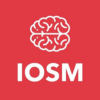A Briefing on Purpose and Vision: The Last Decade of Science
- IOSM Team

- Oct 28, 2025
- 7 min read
Updated: Nov 19, 2025

Purpose is our personal reason for existence and provides direction and motivation through the intersection of our values, passions, and skills. It's a guiding force that influences our decisions, shapes our goals, and gives our lives a sense of meaning, often involving a contribution to something larger than ourselves.
That "something larger" for many of us starts with our work. In 2021, McKinsey reported that 70% of employees define their sense of purpose by their work, and when fulfilled, are six times more likely to want to stay with their company.
Findings like these have extended interest in human purpose beyond the philosophical, to its social and commercial implications. How to create and align purpose is an important theme now in matters of motivation, engagement, and leadership—and as a lever for corporate culture, alignment, and teamwork.
Across science and management research, the findings converge on a simple conclusion: when people understand why their work matters, they perform better, stay longer, and experience greater fulfillment.
This briefing summarizes what studies, consulting reports, and leadership research have shown about purpose over the past decade — and what these insights mean for today’s leaders and organizations.
Why Purpose Matters
Business and social science research confirm that purpose correlates with the most positive indicators of individual and organizational health and effectiveness. We've learned that personal and shared company purpose are essential elements of workforce well-being, performance, and productivity.
Deloitte’s global studies (2020, 2023) found that mission-driven companies experience 40 percent higher workforce retention and 30 percent higher innovation rates than competitors. Harvard Business Review contributors echo these findings: shared purpose and community consistently rank among the top reasons people remain with their employers.
Through an enterprise lens, purpose has become a measurable differentiator. Jump Associates’ 2023 Business Case for Purpose found that companies with authentic, embedded purpose outperformed their peers by an average 13.6 percent compound annual return over 20 years. Deloitte’s Monitor Institute has gone further, identifying a “purpose premium”—consistent overperformance across six key business drivers: innovation, trust, engagement, loyalty, ESG outcomes, and long-term growth.
Takeaway:
Purpose is more than a cultural virtue. It’s a strategic capability that aligns intention, planning, and execution. Across all forms of research—scientific, psychological, and economic—the evidence points to purpose as an essential foundation for personal, leadership, and workforce performance.
The Neuroscience of Purpose
Purpose drives measurable activities in the brain.
Purposeful thinking and behaviors engage multiple brain systems simultaneously: The default mode network, which governs self-reflection and identity, the prefrontal cortex, responsible for planning and moral reasoning, and the dopaminergic reward system, which regulates motivation and persistence.
This integrated neural activity explains how purpose translates into tangible outcomes. The PFC's logical planning and foresight, when paired with the reward system's motivational drive, facilitate the organization and execution of complex, long-term goals.
Moreover, this synergy is crucial for creative problem-solving and leadership. By allowing the DMN's mind-wandering to generate novel ideas, the PFC can then filter and align these associations with a guiding purpose, culminating in new insights and a shareable vision.
Takeaway:
Purpose synchronizes cognitive and motivational systems that drive interest, engagement, and persistence. Conscious purpose makes the brain at once more creative and better able to organize and execute.
The Biology of Purpose
Purpose is a psychological process with biological outcomes.
Longitudinal studies from Rush University led by Dr. Patricia Boyle found that older adults with a strong sense of purpose were half as likely to develop Alzheimer’s disease and maintained stronger “cognitive reserve”—the brain’s capacity to stay resilient under stress. Recent research from UC Davis found that purpose supports neural connectivity, even in people with genetic risk factors for cognitive decline.
Other studies have shown that people with a clear sense of purpose experience a 22 percent lower risk of stroke, improved cardiovascular health, and a 17 percent lower risk of all-cause mortality. At scale, these individual outcomes can have a significant impact on the organization.
Takeaway:
These are interesting data because a workforce grounded in purpose is healthier, physically less prone to exhaustion and burnout, and more resilient. In other words, the biology that keeps individuals healthy also sustains energy and effort in the workplace.
The Psychology of Purpose
Purpose is a measurable element in employee well-being.
Psychologists have long understood that meaning and agency are essential for mental health. Over the past decade, this connection has been firmly quantified.
Studies in Frontiers in Psychology (2023) show that individuals with a strong sense of purpose report greater life satisfaction and fewer depressive symptoms. A meta-analysis published by the American Psychiatric Association (2023) found consistent reductions in stress among people with a clear purpose, regardless of age, sex, or ethnicity.
These findings trace back to a classic 1974 study by Ellen Langer and Judith Rodin, which showed that nursing home residents given the responsibility to care for a plant experienced dramatic improvements in well-being and survival. The principle remains true at scale: purpose fuels motivation, and motivation sustains vitality.
Takeaway:
In a workplace beset with record change, uncertainty, overwhelm, and burnout, mental health is a core organizational concern. Individual purpose and an organization's ability to create shared purpose are key variables in workplace well-being, which increasingly drives financial results.
A Generational Demand for Purpose
Purpose has never been more important at work.
The generational workforce shift has turned purpose into a labor-force keyword. Raj Sisodia, author of Firms of Endearment, has documented how purpose-driven companies outperform financially while also attracting young workers seeking impact and meaning. Maria Emilia Correa, co-founder of Sistema B, notes that Millennials and Gen Z “vote with their feet,” choosing employers who align with their values and leaving those who don’t.
Gallup’s Global Workplace Reports show that for these generations, purpose, wellbeing, and flexibility now outrank compensation. Deloitte’s Millennial Surveys report the same trend: young professionals expect to work for companies that “make a difference.”
Takeaway:
Purpose is a social contract in the evolving workplace. Younger workers want to align their purpose with their organization's impact on people and the planet. Companies that ignore this shift risk irrelevance; those that embrace it gain loyalty, creativity, and reputational strength.
A Strategy of Purpose and Vision
Purpose has become a strategic capability. It aligns thousands of individual decisions with a single unifying principle: why I (and my organization) exist. That alignment fosters coherence—an internal integrity that drives innovation, trust, and consistent execution. In a volatile economy, purpose is a foundational organizational capability.
As purpose defines why we exist, vision defines where we’re going.
Cognitive neuroscience shows that envisioning future outcomes activates the brain’s future simulation network — linking circuitry also used for planning and persistence. Studies in performance psychology demonstrate that imagining a desired outcome strengthens the neural pathways that drive goal pursuit.
Purpose integrates emotional, cognitive, and motivational networks – vision extends that integration into future-directed action. Neuroscience shows they shape brain architecture; psychology shows they protect mental health; organizational research shows they drive innovation, engagement, productivity, and profitability.
For leaders, this matters: when vision is anchored in authentic purpose, it energizes the organization by connecting our sense of meaning to our daily work. As Liz Koehler put it, “People want to be proud of what they do and who they work for.”
Takeaway:
Purpose is the compass; vision is the horizon. Together, they convert meaning into momentum. Importantly, these capacities are not static—they can be trained.
The Trainable Nature of Purpose and Vision
Neuroscience confirms that purpose and vision are not immutable traits—they are trainable neural skills that can be developed through direct, experiential learning—the kind of learning that retrains neural networks in the brain.
Traditional, explicit learning—lectures, reading, discussion—builds understanding, but cannot directly create the neural circuits that express purpose and vision. This requires procedural learning through embodied experience.
Neural training requires a new teaching and learning skillset—one that integrates our traditional explicit methods of skills training with experiential neural exercises that embody and activate them.
Purpose and vision are skills of the mind – and it is critical for organizations not only to understand what they are, and what they do – but importantly, how to train them into their leaders, workforce, and culture.
References
Scientific and Academic Research
Boyle, P. A., Barnes, L. L., Buchman, A. S., & Bennett, D. A. (2010). Effect of purpose in life on risk of incident Alzheimer disease and mild cognitive impairment in community-dwelling older persons. Neurology, 74(10), 804–810.
Kim, E. S., Sun, J. K., Park, N., & Peterson, C. (2013). Purpose in life and reduced incidence of stroke in older adults: The Health and Retirement Study. Journal of Psychosomatic Research, 74(5), 427–432.
Cohen, R., Bavishi, C., & Rozanski, A. (2016). Purpose in life and its relationship to all-cause mortality and cardiovascular events: A meta-analysis. Psychosomatic Medicine, 78(2), 122–133.
Langer, E. J., & Rodin, J. (1976). The effects of choice and enhanced personal responsibility for the aged: A field experiment in an institutional setting. Journal of Personality and Social Psychology, 34(2), 191–198.
Frontiers in Psychology (2023). Sense of purpose, life satisfaction, and mental health: Cross-sectional and longitudinal evidence.
American Psychiatric Association (2023). Purpose in life and psychological well-being: A meta-analytic review. Psychiatry Online.
UC Davis Health (2025). Strong sense of purpose linked to brain resilience and reduced cognitive decline.
Consulting and Business Research
Deloitte Insights (2020, 2023). Global Human Capital Trends Reports. Deloitte Development LLC.
Deloitte Monitor Institute (2023). The Purpose Premium: The Business Case for Purpose in 2023. Deloitte Development LLC.
McKinsey & Company (2021). Help your employees find purpose—or watch them leave. McKinsey Quarterly.
Jump Associates (2023). The Business Case for Purpose: Why Companies with Purpose Outperform. Jump Associates White Paper.
Harvard Business Review (2021). The power of purpose and community in employee engagement. Harvard Business Publishing.
Gallup (2022). State of the Global Workplace: The voice of the world’s employees.
PwC (2021). Putting Purpose to Work: A Study of Purpose in the Workplace. PricewaterhouseCoopers LLP.
Deloitte (2024). Global Millennial and Gen Z Survey: The Resilient Generation. Deloitte Development LLC.
Books and Thought Leadership
Sisodia, R., Wolfe, D. B., & Sheth, J. N. (2014). Firms of Endearment: How World-Class Companies Profit from Passion and Purpose (2nd ed.). Pearson Education.
Correa, M. E., & Sistema B (2023). Purpose-driven entrepreneurship in Latin America. Sistema B Publications.
Koehler, L. (2021). The North Star of Purpose: Building Cohesion at BlackRock. BlackRock Leadership Insights.
Author: Michael Foster
Organization: Institute for Organizational Science and Mindfulness (IOSM)
Email: mike@iomindfulness.org
IOSM Web: iomindfulness.org
OMN Web: om-network.org
About IOSM
The Institute for Organizational Science and Mindfulness (IOSM) is a global association of human capital and operating leaders, educators, and coaches. We share a common mission to apply neuroscience and neural training to develop more effective leaders, a happier, healthier, and higher-performing workforce, and a safer, more inclusive, and more productive workplace.




Comments